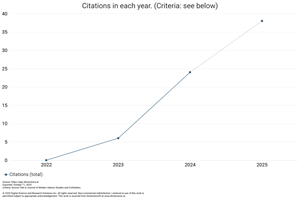Actualization of Contemporary Islamic Education Concepts: A Study of the Thoughts of Sayyid Naquib Al-Attas and Buya Hamka
DOI:
https://doi.org/10.59653/jmisc.v2i01.486Keywords:
Islamic Education, buya hamka, sayyid naquib al-attasAbstract
The crisis of Islamic education, along with other pressing issues, has long been apparent within the Islamic world. According to Al-Faruqi, the education sector is suspected to be experiencing the worst crisis. This should not happen because the spirit of renewal in Islam should not only touch upon political, military, and economic aspects but should also be more focused on education. This type of research is a literature review, utilizing a factual-historical approach concerning prominent figures. Through several efforts, this research concludes that what has been formulated by Al-Attas and Hamka, particularly regarding education, is their intellectual jihad to realize an ideal Islamic education system. This system is based on moral, spiritual, and religious values. The orientation and values of Islamic education fundamentally lie in the harmony and balance of the complete individual, encompassing both the physical and spiritual aspects of human beings. Similarly, when viewed in terms of the human function as the servant of Allah ('abd Allah), symbolizing the vertical dimension, and as the vicegerent on earth (khalifah fi al-ard), symbolizing the horizontal dimension.
Downloads
References
al-Attas, S. M. N. (1979). Preliminary Thoughts on the Nature of Knowledge and the Definition and Aims of Education. In S. M. N. Al-Attas (Ed.), Aims and Objectives of Islamic Education (pp. 36). Jeddah: Universitas King Abdul Azis.
al-Attas, S. M. N. (1980). The Concept of Education in Islam: A Framework for A Philosophy of Education. Kuala Lumpur: Muslim Youth Movement of Malaysia (ABIM).
al-Attas, S. M. N. (n.d.). Islam and Secularism. Kuala Lumpur: International Institute of Islamic Thought and Civilization (ISTAC).
al-Faruqi, I. R. (1988). Tauhid: Its Implications for Thought and Life. (R. Astuti, Trans.) Bandung: Pustaka.
Arifin, A. (2003). Memahami Paradigma Baru Pendidikan Nasional dalam Undang-undang Sisdiknas, 2003.
Baker, A., & Zubair, A. C. (1990). Metodologi Penelitian Filsafat. Yogyakarta: Kanisius.
Bawani, I. (1987). Segi-segi Pendidikan Islam. Surabaya: al-Ikhlas.
Daud, W. (n.d.). The Educational Philosophy. (Loc. Cit.) Kuala Lumpur: ISTAC.
Daud, W. M. N. W. (1998). The Educational Philosophy and Practice of Syed Muhammad Naquib Al-Attas. Kuala Lumpur: ISTAC.
Fakhrurrazi, F., Wasilah, N., & Jaya, H. (2023). Islam and Knowledge: Harmony between Sciences and Faith. Journal of Modern Islamic Studies and Civilization, 2(01 SE-Articles), 45–57. https://doi.org/10.59653/jmisc.v2i01.416
Hamka. (1984). Lembaga Hidup. (Cet. vii.) Jakarta: PT. Pustaka Panjimas.
Husein, M. (1983). Pendidikan Islam dalam Lintasan Sejarah. Yogyakarta: Nur Cahaya.
Husein, M. (n.d.). Pendidikan Islam. (Loc. Cit.) Bandung: Pustaka.
Husein, S. S., & Ashraf, S. A. (1986). Crisis in Muslim Education. (R. Astuti, Trans.) Bandung: Risalah.
Khadavi, J., Nizar, A., & Syahri, A. (2023). Increasing The Effectiveness of Islamic Religious Education Learning in Building Students’s Spiritual Intelligence. International Journal of Islamic Thought and Humanities, 2(2). https://doi.org/10.54298/ijith.v2i2.104
Mahmudah, M. (2020). Tujuan Pendidikan Islam dalam Mencetak SDM Unggul. Jurnal Keislaman, 3(2). https://doi.org/10.54298/jk.v3i2.3155
Mahmudah, M. (2021). Mengembangkan Profesionalisme Guru Pendidikan Agama Islam (PAI) Melalui Model-Model Pembelajaran. Jurnal Keislaman, 4(1). https://doi.org/10.54298/jk.v4i1.3269
Nizar, S. (2008). Memperbincangkan Dinamika dan Pemikiran Hamka tentang Pendidikan Islam. Jakarta: Prenada Media Group.
Nurmaliyah, Y., Aripin, S., & Nurdiansyah, N. M. (2023). 2013 Curriculum: Implementation of Islamic Religious Education Learning in Schools for Children with Special Needs. International Journal of Islamic Thought and Humanities, 2(1 SE-Articles), 124–138. https://doi.org/10.54298/ijith.v2i1.83
Ramayulis, & Nizar, S. (2009). Filsafat Pendidikan Islam. Jakarta: Kalam Mulia.
Ramayulis. (2003). Ilmu Pendidikan Islam. Jakarta: Kalam Mulia.
Sholeh, M. I. (2023). Technology Integration in Islamic Education: Policy Framework and Adoption Challenges. Journal of Modern Islamic Studies and Civilization, 1(02 SE-Articles), 82–100. https://doi.org/10.59653/jmisc.v1i02.155
SM, I. (1999). Paradigma Pendidikan Islam Prof. DR. Syed Muhammad Naquib Al-Attas. In R. Thoyyib & Darmu’in (Eds.), Pemikiran Pendidikan Islam: Kajian Tokoh Klasik dan Kontemporer (pp. 283). Yogyakarta: Pustaka Pelajar.
Sucipto, H. (2003). Ensiklopedi Tokoh Islam, dari Abu Bakr sampai Nasr dan Qardawi. Bandung: Hikmah.
Syukur, A., Nata, A., Rosyada, D., & Suralaga, F. (2023). Learning Management of Islamic Religious Education (PAI) Based on Multiple Intelligences at SMA IT Insan Mandiri Cibubur. International Journal of Islamic Thought and Humanities, 2(1). https://doi.org/10.54298/ijith.v2i1.52
Yatim, B. (2001). Sejarah Peradaban Islam (2nd ed.). Jakarta: Raja Grafindo Persada.
Zahroh, L. (2021). ANALISIS TERHADAP PEMIKIRAN HAMKA DAN MUHAMMAD IQBAL TENTANG TUJUAN PENDIDIKAN. Jurnal Keislaman, 2(1). https://doi.org/10.54298/jk.v2i1.3375
Downloads
Published
How to Cite
Issue
Section
License
Copyright (c) 2023 Syaifudin Noer

This work is licensed under a Creative Commons Attribution-ShareAlike 4.0 International License.
Authors who publish with this journal agree to the following terms:
- Authors retain copyright and grant the journal right of first publication with the work simultaneously licensed under a Creative Commons Attribution-ShareAlike that allows others to share the work with an acknowledgement of the work's authorship and initial publication in this journal.
- Authors are able to enter into separate, additional contractual arrangements for the non-exclusive distribution of the journal's published version of the work (e.g., post it to an institutional repository or publish it in a book), with an acknowledgement of its initial publication in this journal.
- Authors are permitted and encouraged to post their work online (e.g., in institutional repositories or on their website) prior to and during the submission process, as it can lead to productive exchanges, as well as earlier and greater citation of published work (See The Effect of Open Access).
























